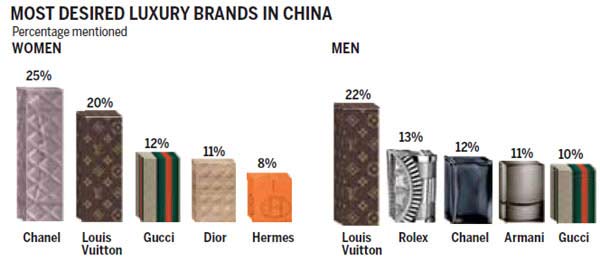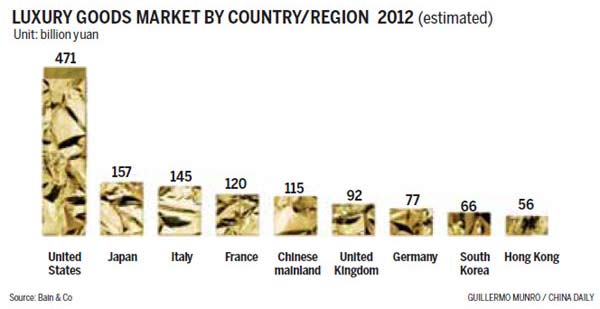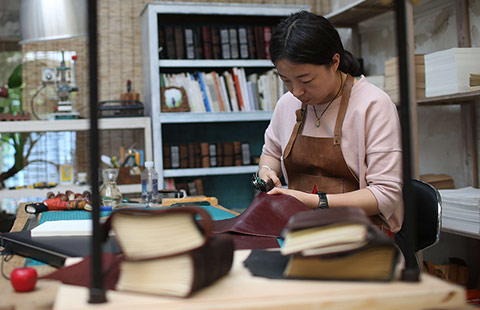

Tightened policies on government spending for luxury goods in China have put a temporary cap on the buying of luxury goods as gifts, which has contributed to the slowest annual growth of the market in five years.
That's according to the findings of the latest Bain & Co report released on Wednesday. The consultancy predicted luxury sales on the Chinese mainland to grow a meager 7 percent this year.

He cited a government regulation, effective from October, forbidding government spending on extravagant items, as well as the social media exposure of a number of government officials with luxury goods brands.
Lannes said products for men will be hardest hit by the changes. "Basically, it's watches and menswear that are most reliant on gift spending."
However, the sector is likely to rebound next year because gifts have been a major feature and tradition of the country's luxury market for years.
Lannes predicted there will be a paradigm shift, and said future gift items will likely have less conspicuous branding.
The luxury market value on the Chinese mainland is expected to hit 113 billion yuan ($18.07 billion) by the end of the year. Watches are expected to be among the hardest hit categories with a 5 percent drop in market value.
However, Chinese purchases worldwide reached 306 billion yuan with spending abroad rocketing by 31 percent.
More than 60 percent of consumption took place in overseas markets, driven by the depreciation of major foreign currencies, and dynamic overseas travel.
As a result, traditional shopping hotspot Hong Kong is losing out to European and US cities, with its growth rate slowing down to around 10 percent.
"More Chinese shoppers have learned to take advantage of the weaker euro and US dollar. For big-ticket items such as watches and jewelry, you can see as much as a 40 percent pricing gap between the euro and the yuan," Lannes said.

The luxury market outlook for 2013 is expected to pick up moderately from the 2012 level, the report said, despite some challenges and uncertainties in the economic environment.
That echoed a study by McKinsey & Co that suggested China may claim one third of luxury spending worldwide with a projected $27 billion by 2015.
However, the annual increase rate of consumption in the domestic market will subside from about 18 percent for the past four years to an annual rate of between 12 and 16 percent for the next three years, according to McKinsey.
The survey also showed that Chinese consumers' tastes in luxury products are maturing with surprising speed.
"Shoppers with just a few years' experience increasingly prefer low-key and understated goods more than the ones that are emblazoned with popular logos," said Yuval Atsmon, a consultant at McKinsey and co-author of the report.
Lannes agreed. He said Chinese buyers in first-tier cities are shifting away from the typical emerging market preference for logos and turning to unique, high-quality and understated luxury items.
But both believe that the market is still fragmented, as the fast-growing numbers of new entrants still favor widely recognizable brands that show off their status.
Contact the writers at hewei@chinadaily.com.cn and yuran@chinadaily.com.cn
Related Stories
Chinese shoppers offer glimmer of hope for gloomy economy Top 10 Chinese internet companies
Top 10 Chinese internet companies
 Fun time for children at international toy expo in Beijing
Fun time for children at international toy expo in Beijing
 Huawei launches new smartphone P9 in Vietnam
Huawei launches new smartphone P9 in Vietnam
 Top 10 box office movies on China market in H1
Top 10 box office movies on China market in H1
 Woman resigned from high salary job to make notebooks
Woman resigned from high salary job to make notebooks
 Hurun publishes Global Chinese Big Philanthropy Report 2016
Hurun publishes Global Chinese Big Philanthropy Report 2016
 Top 10 new economy issues in China
Top 10 new economy issues in China
 Wetland helps preserve ecology of Dianchi Lake
Wetland helps preserve ecology of Dianchi Lake

